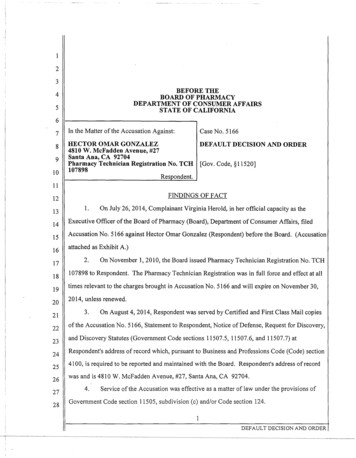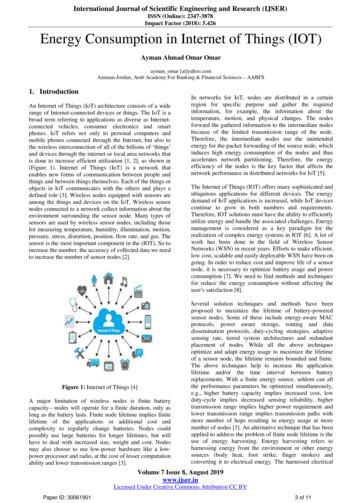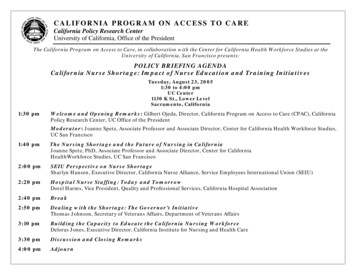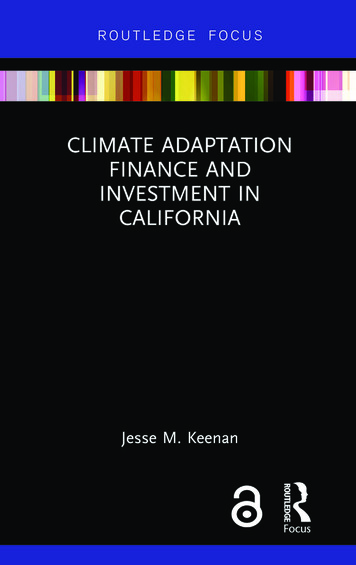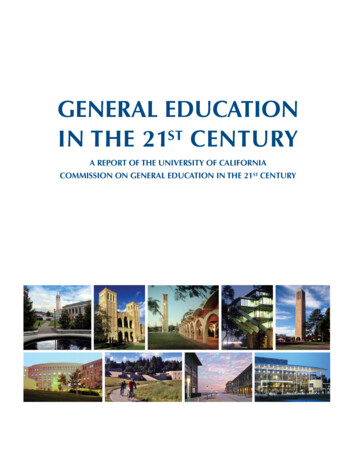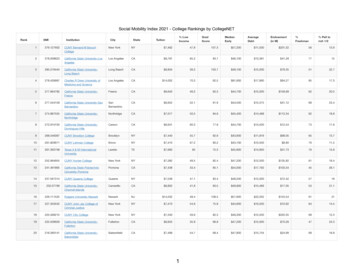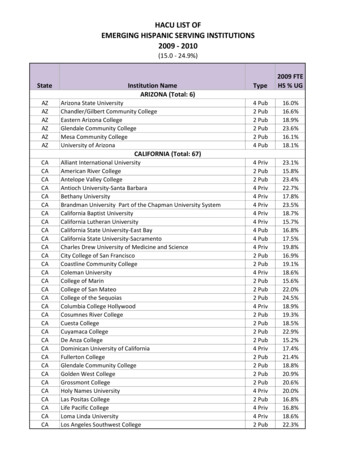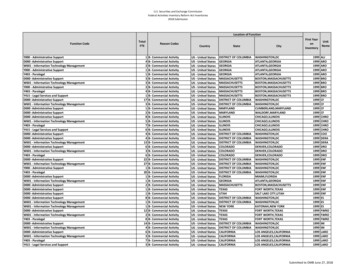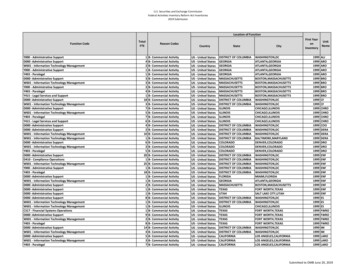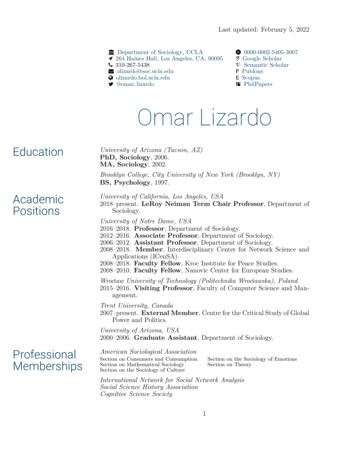
Transcription
Last updated: February 5, 2022 Department of Sociology, UCLA 264 Haines Hall, Los Angeles, CA, 90095 310-267-5438 olizardo@soc.ucla.edu olizardo.bol.ucla.edu @omar lizardo 0000-0002-5405-3007 Google Scholar Semantic Scholar Publons Scopus PhilPapersOmar LizardoEducationUniversity of Arizona (Tucson, AZ)PhD, Sociology, 2006.MA, Sociology, 2002.Brooklyn College, City University of New York (Brooklyn, NY)BS, Psychology, 1997.AcademicPositionsUniversity of California, Los Angeles, USA2018–present. LeRoy Neiman Term Chair Professor, Department ofSociology.University of Notre Dame, USA2016–2018. Professor, Department of Sociology.2012–2016. Associate Professor, Department of Sociology.2006–2012. Assistant Professor, Department of Sociology.2008–2018. Member, Interdisciplinary Center for Network Science andApplications (ICenSA).2008–2018. Faculty Fellow, Kroc Institute for Peace Studies.2008–2010. Faculty Fellow, Nanovic Center for European Studies.Wroclaw University of Technology (Politechnika Wroclawska), Poland2015–2016. Visiting Professor, Faculty of Computer Science and Management.Trent University, Canada2007–present. External Member, Centre for the Critical Study of GlobalPower and Politics.University of Arizona, USA2000–2006. Graduate Assistant, Department of Sociology.ProfessionalMembershipsAmerican Sociological AssociationSection on Consumers and ConsumptionSection on Mathematical SociologySection on the Sociology of CultureSection on the Sociology of EmotionsSection on TheoryInternational Network for Social Network AnalysisSocial Science History AssociationCognitive Science Society1
Last updated: February 5, 2022Distinctions,Honors,and Awards– Elected member, Sociological Research Association, 2019.– (with Michael Strand), American Sociological Association Section onTheory Theory Prize for Outstanding Article for “Beyond world images: Belief as embodied action in the world” (Honorable Mention),2017.– (with Jessica Collett), American Sociological Association Section onEmotions Recent Contribution Award for “Embarrassment and social organization: A multiple identities model” (Honorable Mention),2015.– (with Robert Fishman), American Sociological Association Sectionon Comparative and Historical Sociology Charles Tilly Best Article Award for “‘How macro-historical change shapes cultural taste:Legacies of democratization in Spain and Portugal,” 2014.– (with Aaron Striegel, Shu Liu, Lei meng, Christian Poelleabauer,and David Hachen) Best Paper Award at The Fifth ACM HotplanetWorkshop, Hong Kong 2013.– American Sociological Association Section on Theory Lewis CoserAward for Theoretical Agenda Setting, 2013.– American Sociological Association Section on Culture Clifford GeertzPrize for Best Article for “How cultural tastes shape personal networks,” 2008.– (with Jessica Collett), American Sociological Association Section onReligion Best Graduate Student Paper Award for “Why biology is not(religious) destiny: a second look at gender differences in religiosity,”2005.– (with Jessica Collett), American Sociological Association Section onEmotions Best Graduate Student Paper Award for “Socioeconomicstatus and the experience of anger,” 2005.– University of Arizona Department of Sociology’s Raymond V. Bowers Graduate Student Paper Competition for “Why biology is not(religious) destiny: a second look at gender differences in religiosity,”2005.– University of Arizona Department of Sociology’s Raymond V. BowersGraduate Student Paper Competition for “The effect of employmentstatus on gender differences in culture consumption,” 2003.– Student Paper Competition, Graduate Division General Social Surveyfor “The effect of employment status on gender differences in cultureconsumption” (Honorable Mention), 2003.2
Last updated: February 5, 2022BooksSeth Abrutyn and Omar Lizardo (Eds.). Handbook of Classical Sociological Theory. Springer. doi:10.1007/978-3-030-78205-4John Mohr, Christopher A. Bail, Margaret Frye, Jennifer C. Lena, OmarLizardo, Terence E. McDonnell, Ann Mische, Iddo Tavory and Frederick Wherry. 2020. Measuring Culture. Columbia University Press.doi:10.7312/mohr18028Elliot Weininger, Annette Lareau and Omar Lizardo (Eds). 2019. Ritual, Emotion, Violence: Studies on the Micro-Sociology of RandallCollins. Routledge. g Wang, Brando Sepulvado, Omar Lizardo and David Hachen. “Incubators or diffusers? Examining the dynamic coupling of context andsocial ties across multiple foci.” Social Networks.Michael Strand and Omar Lizardo. “Chance, orientation, and interpretation: Max Weber’s Probabilism and the future of social theory.”Sociological Theory.Cheng Wang, Omar Lizardo and David Hachen. “A longitudinal studyof Fitbit usage behavior among college students.” Cyberpsychology,Behavior, and Social Networking. doi:10.1089/cyber.2021.0047Omar Lizardo. “What is implicit culture?” Journal for the Theory ofSocial Behaviour. doi:10.1111/jtsb.12333Michael Strand and Omar Lizardo. “For a probabilistic sociology: A history of concept formation with Pierre Bourdieu.” Theory and Society.doi:10.1007/s11186-021-09452-22021Omar Lizardo. 2021. “Culture, cognition, and internalization.” Sociological Forum 36: 1177-1206.* doi:10.1111/socf.12771Cheng Wang, Stephen Mattingly, Jessica Payne, Omar Lizardo andDavid Hachen. 2021. “The impact of social networks on sleep amonga cohort of college students.” SSM Population Health 16: 100937.doi:10.1016/j.ssmph.2021.100937James Flamino, Boleslaw K. Szymański, Ashwin Bahulkar, Kevin Chanand Omar Lizardo. 2021. “Creation, evolution, and dissolution ofsocial groups.” Scientific Reports 11: 17470.doi:10.1038/s41598-021-96805-7Omar Lizardo. 2021. “Habit and the explanation of action.” Journal forthe Theory of Social Behaviour 51: 391-411. doi:10.1111/jtsb.12273Shikang Liu, Fatemeh Vahedian, David Hachen, Omar Lizardo, Christian Poellabauer, Aaron Striegel and Tijana Milenković. “Heterogeneous network approach to predict individuals’ mental health.” ACMTransactions on Knowledge Discovery from Data (TKDD) 15: 1-26.doi:10.1145/3429446Cheng Wang, Omar Lizardo and David Hachen. 2021. “Using big datato examine the effect of urbanism on social networks.” Journal ofUrban Affairs 43:40-56. doi:10.1080/07352166.2018.1550350Cheng Wang, Omar Lizardo and David Hachen. 2021. “Using Fitbitdata to examine factors that affect daily activity levels of college students.” PloS One 16: e0244747. doi:10.1371/journal.pone.0244747*Lead article.3
Last updated: February 5, 2022Radoslaw Michalski, Boleslaw K. Szymański, Przemyslaw Kazienko, Christian Lebiere, Omar Lizardo and Marcin Kulisiewicz. 2021. “Social networks through the prism of cognition.” Complexity. doi:10.1155/2021/49639032019-2020Seth Abrutyn and Omar Lizardo. 2020. “Grief, Care, and Play: Theorizing the affective roots of the social self.” Advances in Group Processes37: 79-108. doi:10.1108/S0882-614520200000037004Brandon Sepulvado, Michael Lee Wood, Ethan Fridmanski, Cheng Wang,Matthew J. Chandler, Omar Lizardo, David Hachen 2020. “Predicting homophily and social network connectivity from dyadic behavioral similarity trajectory clusters.” Social Science Computer Review.doi:10.1177/0894439320923123Ethan Fridmanski, Michael Lee Wood, Omar Lizardo and David Hachen.2020. “Clustering in a newly Forming social network by subjectiveperceptions of loneliness.” Journal of American College Health. doi:10.1080/07448481.2020.1806852Cheng Wang, Omar Lizardo and David Hachen. 2020. “Using Fitbit data to monitor the heart rate evolution patterns of college students.” Journal of American College Health doi:10.1080/07448481.2020.1775610Cheng Wang, Omar Lizardo and David S. Hachen. 2020. “Neither influence nor selection: Examining the co-evolution of political orientationand social networks in the NetSense and NetHealth studies.” PloS one15: e0233458. doi:10.1371/journal.pone.0233458Omar Lizardo, Brandon Sepulvado, Dustin S. Stoltz, Marshall A. Taylor.2020. “What can cognitive neuroscience do for cultural sociology?”American Journal of Cultural Sociology 8: 3-28.doi:10.1057/s41290-019-00077-8Shikang Liu, David Hachen, Omar Lizardo, Christian Poellabauer, AaronStriegel and Tijana Milenković. 2020. “The power of dynamic socialnetworks to predict individuals’ mental health.” Biocomputing 25:635-646. doi:10.1142/9789811215636 0056Jeff Larson and Omar Lizardo. 2019. “Institutional movement logicsand the changing shape of the U.S. social movement field, 1960–1995.”Social Forces. 97: 1389–1422. doi:10.1093/sf/soy122Omar Lizardo. 2019. “Simmel’s dialectic of form and content in recent work in cultural sociology.” The Germanic Review: Literature,Culture, Theory 94:93-100. doi:10.1080/00168890.2019.1585664Louis Faust, Cheng Wang, David Hachen, Omar Lizardo, Nitesh V.Chawla. 2019. “Physical Activity Trend eXtraction: A framework forextracting moderate-vigorous physical activity trends From wearablefitness tracker data.” JMIR Mhealth Uhealth 7:e11075. doi:10.2196/11075Omar Lizardo. 2019. “Specifying the ‘what’ and separating the ‘how’:Doings, sayings, codes, and artifacts as the building blocks of institutions.” Research in the Sociology of Organizations 65(A): uis Faust, Priscilla Jiménez-Pazmino, James K. Holland, Omar Lizardo,David Hachen and Nitesh V. Chawla. 2019. “What 30 Days tells us4
Last updated: February 5, 2022about 3 Years: Identifying early signs of user abandonment and nonadherence.” Proceedings of the 13th EAI International Conference onPervasive Computing Technologies for Healthcare (PervasiveHealth):216-224. doi:10.1145/3329189.33291962017-2018Shikang Liu, David Hachen; Omar Lizardo, Christian Poellabauer, AaronStriegel and Tijana Milenković. 2018. “Network analysis of theNetHealth data: Exploring the co-evolution of individuals’ social networks and physical activities.” Applied Network Science 3:45.doi:10.1007/s41109-018-0103-2Omar Lizardo, Dustin S. Stoltz, Marshall A. Taylor and Michael LeeWood. 2018. “Visualizing bring-backs.” Socius: Sociological Researchfor a Dynamic World 4. doi:10.1177/2378023118805362Ashwin Bahulkar, Boleslaw K. Szymański, Kevin Chan and Omar Lizardo.2018. “Impact of attributes on group formation.” Proceedings of theIEEE/ACM International Conference on Advances in Social NetworksAnalysis and Mining (ASONAM): 1250-1257. doi:10.1109/asonam.2018.8508658Louis Faust, David Hachen, Omar Lizardo and Nitesh Chawla. 2018.“Quantifying subjective well-being using trends in weekend activity.”Proceedings of the IEEE International Conference on Healthcare Informatics (ICHI): 123-129. doi:10.1109/ichi.2018.00021Omar Lizardo. 2018. “The mutual specification of genres and audiences:Reflective two-mode centralities in person-to-culture choice data.” Poetics: Journal of Empirical Research on Culture, the Media and theArts 68: 52-71. doi:10.1016/j.poetic.2018.04.003Dustin S. Stoltz and Omar Lizardo. 2018. “Deliberate trust and intuitivefaith: A dual-process model of reliance.” Journal for the Theory ofSocial Behaviour 48: 230-250. doi:10.1111/jtsb.12160Omar Lizardo and Dustin S. Stoltz. 2018. “Max Weber’s ideal versusmaterial interest distinction revisited.” European Journal of SocialTheory 21: 3–21.* doi:10.1177/1368431017710906Sudip Vhaduri, Christian Poellabauer, Aaron Striegel, Omar Lizardoand David Hachen. 2017. “Discovering places of interest using sensor data from smartphones and wearables.” Proceedings of the IEEEInternational Conference on SmartWorld, Ubiquitous Intelligence &Computing: 1-8. doi:10.1109/UIC-ATC.2017.8397495Brandon Sepulvado and Omar Lizardo. 2017. “Cognitive sociology inFrance.” American Sociologist 48: 366-381.doi:10.1007/s12108-017-9341-5Ashwin Bahulkar, Boleslaw K. Szymański, Kevin Chan and Omar Lizardo.2017. “Coevolution of a multilayer node-aligned network of whichlayers represent different social relations.” Computational Social Networks 4: 11 doi:10.1186/s40649-017-0047-1Ashwin Bahulkar, Boleslaw K. Szymański, Nitesh Chawla, Omar Lizardoand Kevin Chan. 2017. “Influence of personal preferences on linkdynamics in social networks.” Complexity doi:10.1155/2017/4543563Michael Strand and Omar Lizardo. 2017. “The hysteresis effect: Theorizing the regularity of mismatch in action” Journal for the Theory*Lead article.5
Last updated: February 5, 2022of Social Behaviour 47: 164–194. doi:10.1111/jtsb.12117Louis Faust, Rachael Purta, David Hachen, Aaron Striegel, ChristianPoellabauer, Omar Lizardo, Nitesh V. Chawla. 2017. “Exploring compliance: Observations from a large scale Fitbit study.” Proceedings of the 2nd International Workshop on Social Sensing (SOCIALSENS): 55-60. doi:10.1145/3055601.3055608Omar Lizardo. 2017. “Improving cultural analysis: Considering personal culture in its declarative and nondeclarative modes.” AmericanSociological Review 82: 88-115. doi:10.1177/0003122416675175Joseph Cabrera, Stephan Scholz, George Hobor and Omar Lizardo.2017. “Integrating ‘standard’ residents into ‘non-standard’ communities: A longitudinal analysis of social capital in a new urbanist development.” Journal of Urbanism 10: 63-76. doi:10.1080/17549175.2016.11396202015-2016Ashwin Bahulkar, Boleslaw K. Szymański, Kevin Chan and Omar Lizardo.2016. “Co-evolution of two networks representing different social relations in NetSense.” Pp. 423-434 in H. Cherifi, S. Gaito, W. Quattrociocchi and A. Sala (Eds.) Complex Networks & Their Applications V: Proceedings of the 5th International Workshop on ComplexNetworks and Their Applications (COMPLEX NETWORKS 2016).Cham, Switzerland: Springer. doi:10.1007/978-3-319-50901-3 34Omar Lizardo, Robert Mowry, Brandon Sepulvado, Dustin S. Stoltz,Marshall A. Taylor, Justin Van Ness and Michael Lee Wood. 2016.“What are dual process models? Implications for cultural analysis in sociology.” Sociological Theory 34: 287-310.* doi:10.1177/0735275116675900Rachel Purta, Stephen Mattingly, Lixing Song, Omar Lizardo, DavidHachen, Christian Poellabauer and Aaron Striegel. 2016. “Experiences measuring sleep and physical activity patterns across a large college cohort with fitbits.” Proceedings of the ACM International Symposium on Wearable Computers 28-35. doi:10.1145/2971763.2971767Omar Lizardo. 2016. “Why ‘cultural matters’ matter: Culture talk asthe mobilization of cultural capital in interaction.” Poetics: Journalof Empirical Research on Culture, the Media and the Arts 58: 1-17.*doi:10.1016/j.poetic.2016.09.002Stephen Vaisey and Omar Lizardo. 2016. “Cultural fragmentation oracquired dispositions? A new approach to accounting for patterns ofcultural change.” Socius: Sociological Research for a Dynamic World2. doi:10.1177/2378023116669726Ashwin Bahulkar, Boleslaw K. Szymański, Omar Lizardo, Yuxiao Dong,Yang Yang and Nitesh V. Chawla. 2016. “Analysis of link formation,persistence, and dissolution in NetSense data.” Proceedings of theIEEE/ACM International Conference on Advances in Social NetworksAnalysis and Mining: 1197-1204.φ doi:10.1109/ASONAM.2016.7752391Omar Lizardo and Sara Skiles. 2016. “Cultural objects as prisms: Perceived audience composition of musical genres as a resource for sym*Lead article.*Lead article.φ Nominated for the Best Paper Award.6
Last updated: February 5, 2022bolic exclusion.” Socius: Sociological Research for a Dynamic World2. doi:10.1177/2378023116641695Omar Lizardo. 2016. “Cultural symbols and cultural power.” Qualitative Sociology 39: 199-204. doi:10.1007/s11133-016-9329-4Omar Lizardo and Sara Skiles. 2016. “The end of symbolic exclusion?The rise of ‘categorical tolerance’ in the musical tastes of Americans:1993 - 2012.” Sociological Science 3: 85-108. doi:10.15195/v3.a5Brandon Sepulvado, Michael Penta, David Hachen and Omar Lizardo.2015. “Social affiliation from religious disaffiliation: Evidence of selective mixing among youth with no religious preference during thetransition to college.” Journal for the Scientific Study of Religion. 54:833-841. doi:10.1111/jssr.12227Omar Lizardo and Sara Skiles. 2015. “Musical taste and patterns ofsymbolic exclusion in the United States 1993–2012: Generational dynamics of differentiation and continuity.” Poetics: Journal of Empirical Research on Culture, the Media and the Arts 53: 9-21.* doi:10.1016/j.poetic.2015.08.003Omar Lizardo, Michael Penta, Matthew Chandler, Casey Doyle, G. Korniss, Boleslaw K. Szymański, and Jonathan Bakdash. 2015. “Analysisof opinion evolution in a multi-cultural student social network.” Proceedings of the 6th International Conference on Applied Human Factors and Ergonomics: 3977-3984. doi:10.1016/j.promfg.2015.07.938Cheng Wang, Omar Lizardo and David Hachen. 2015. “Triadic evolution in a large-scale mobile phone network.” Journal of ComplexNetworks 3: 264-290. doi:10.1093/comnet/cnu030Michael Strand and Omar Lizardo. 2015. “Beyond world images: Beliefas embodied action in the world.” Sociological Theory 33:44-70.φ doi:10.1177/0735275115572397Jeff Larson and Omar Lizardo. 2015. “An institutional logics approachto the analysis of social movement fields.” Social Currents 2: 58-80.doi:10.1017/nws.2014.72013-2014Cheng Wang, David Hachen, and Omar Lizardo. 2013. “The co-evolutionof communication networks and drinking behaviors.” Proceedings ofthe AAAI Fall Symposium Series: 30-36. aper/view/7404Omar Lizardo 2013. “Schmaus’ functionalist approach to the explanation of social facts: An assessment and critique.” Philosophy of theSocial Sciences 43: 453-492. doi:10.1177/0048393112458491Omar Lizardo and Jessica Collett. 2013. “Embarrassment and socialorganization: A multiple identities model.” Social Forces 92: 353-375.doi:10.1093/sf/sot078Aaron Striegel, Shu Liu, Lei Meng, Christian Poellabauer, David Hachen,and Omar Lizardo. 2013. “Lessons learned from the NetSensesmartphone study.” Computer Communication Review 43:51-56.φ doi:10.1145/2491159.2491171Omar Lizardo. 2013. “Reconceptualizing abstract conceptualization in*Lead article.φ Honorable mention, Theory Prize for Outstanding Article.φ Best Paper Award.7
Last updated: February 5, 2022social theory: The case of the ‘structure’ concept.” Journal for theTheory of Social Behaviour 43: 155-180. doi:10.1111/jtsb.12011Robert M. Fishman and Omar Lizardo. 2013. “How macro-historicalchange shapes cultural taste: Legacies of democratization in Spainand Portugal.” American Sociological Review 78: 213-223.ψ doi:10.1177/0003122413478816Cheng Wang, Omar Lizardo, David Hachen, Anthony Strathman, ZoltánToroczkai, and Nitesh Chawla. 2013. “A dyadic reciprocity indexfor repeated interaction networks.” Network Science 1: 31-48.* doi:10.1017/nws.2012.5Omar Lizardo. 2013. “Variety in cultural choice and the activationof social ties.” Social Science Research 42: 321–330. doi:10.1016/j.ssresearch.2012.09.014Cheng Wang, Omar Lizardo and David Hachen. 2014. “Algorithms forgenerating large-scale clustered random graphs.” Network Science 2:403-415. doi:10.1017/nws.2014.7Omar Lizardo. 2014. “Taste and the logic of practice in Distinction.”Czech Sociological Review 50: 335-364. doi:10.13060/00380288.2014.50.3.105Omar Lizardo. 2014. “Omnivorousness as the bridging of cultural holes:A measurement strategy.” Theory and Society 43: 395-419. doi:10.1007/s11186-014-9220-9Omar Lizardo and Melissa Fletcher Pirkey. 2014. “How organizationaltheory can help network theorizing: Linking structure and dynamicsvia cross-level analogies.” Research in the Sociology of Organizations40: 33-56.* r Lizardo and Sara Skiles. 2012. “Reconceptualizing and theorizing‘omnivorousness’: Genetic and relational mechanisms.” SociologicalTheory 30: 260-280. doi:10.1177/0735275112466999Omar Lizardo. 2012. “The conceptual bases of metaphors of dirt andcleanliness in moral and non-moral reasoning.” Cognitive Linguistics23-2: 367-394. doi:10.1515/cog-2012-0011Troy Raeder, Omar Lizardo, David Hachen, and Nitesh V. Chawla.2011. “Predictors of short-term decay of cell phone contacts in alarge scale communication network.” Social Networks 33: 245-257.*doi:10.1016/j.socnet.2011.07.002Omar Lizardo. 2011. “Cultural correlates of ego-network closure.” Sociological Perspectives 54: 479-487. doi:10.1525/sop.2011.54.3.479Omar Lizardo. 2011. “Pierre Bourdieu as a post-cultural theorist.”Cultural Sociology 5: 1-22.* doi:10.1177/1749975510389714Omar Lizardo. 2010. “Beyond the antinomies of structure: Levi-Strauss,Giddens, Bourdieu and Sewell.” Theory and Society 39: 651-688. doi:10.1007/s11186-010-9125-1Jessica Collett and Omar Lizardo. 2010. “Occupational status and theexperience of anger.” Social Forces 88: 2079-2104. doi:10.1353/sof.ψ Winnerof the 2014 Charles Tilly Best Article Award.*Inaugural issue.*Lead article.*Lead article.*Lead article in a special issue edited by Marco Santoro.8
Last updated: February 5, 20222010.0037Stephen Vaisey and Omar Lizardo. 2010. “Can cultural worldviewsinfluence network composition?” Social Forces 88: 1595-1618. doi:10.1353/sof.2010.0009Omar Lizardo and Michael Strand. 2010. “Skills, toolkits, contexts andinstitutions: clarifying the relationship between different approachesto cognition in cultural sociology.” Poetics: Journal of EmpiricalResearch on Culture, the Media and the Arts 38: 204-227. doi:10.1016/j.poetic.2009.11.0032008-2009Omar Lizardo. 2009. “Taking representational dualism seriously: Revisiting the Durkheim-Spencer debate on the rise of individualism.”Sociological Perspectives 52: 533-555. doi:10.1525/sop.2009.52.4.533Omar Lizardo and Michael Strand. 2009. “Postmodernism and globalization.” Protosociology: An International Journal of Interdisciplinary Research Volume 26: 36-72. doi:10.5840/protosociology2009263Omar Lizardo. 2009. “The Devil as cognitive mapping.” RethinkingMarxism: A Journal of Economics Culture & Society 21: 605-618.doi:10.1080/08935690903145838Omar Lizardo.2009. “The comparative analysis of organizational forms:Integrating field and ecological approaches.” Research in the Sociology of Organizations 26: 117-151. doi:10.1108/S0733-558X(2009)0000026007Jessica Collett and Omar Lizardo. 2009. “A power-control theory ofgender and religiosity.” Journal for the Scientific Study of Religion48: 213-231.* doi:10.1111/j.1468-5906.2009.01441.xOmar Lizardo. 2009. “Is a ‘Special Psychology’ of Practice Possible?From Values and Attitudes to Embodied Dispositions.” Theory &Psychology 19: 1-15.* doi:10.1177/0959354309345891Omar Lizardo. 2009. “Formalism, behavioral realism and the interdisciplinary challenge in sociological theory.” Journal for the Theory ofSocial Behaviour. 39: 39-79. doi:10.1111/j.1468-5914.2008.00393.xOmar Lizardo and Sara Skiles. 2009. “Highbrow omnivorousness onthe small screen? Cultural industry systems and patterns of culturalchoice in Europe.” Poetics: Journal of Empirical Research on Culture,the Media and the Arts 37: 1-23.* doi:10.1016/j.poetic.2008.10.001Omar Lizardo. 2008. “The question of culture consumption and stratification revisited.” Sociologica: International Journal for SociologicalDebate 2/2008.*,1 doi:10.2383/27709Omar Lizardo. 2008. “Defining and theorizing terrorism: A global actorcentered approach.” Journal of World Systems Research 14: 91-118.*doi:10.5195/jwsr.2008.341Omar Lizardo. 2008. “Understanding the flow of symbolic goods inthe global cultural economy.” International Journal of Contemporary*Featured article (with peer commentary and authors’ response).*Lead article on a special issue edited by Loïc J. D. Wacquant.*Lead article.*Featured article (with peer commentary and authors’ response).1 Reprinted in: Alan Warde (Ed.), Consumption, Volume IV: Appreciation. Thousand Oaks: Sage Publications, 2010.*Lead article.9
Last updated: February 5, 2022Sociology 45: 13-34.,2Omar Lizardo and Sara Skiles. 2008. “Cultural consumption in thefine and popular arts realms.” Sociology Compass 2: 485-502. doi:10.1111/j.1751-9020.2008.00101.x2003-2007Omar Lizardo. 2007. “Fight Club, or, the cultural contradictions oflate capitalism.” Journal for Cultural Research 11: 221-243. doi:10.1177/02632764070240041102Jeff Larson and Omar Lizardo. 2007. “Generations, identities and thecollective memory of Che Guevara.” Sociological Forum 22: 425-451.doi:10.1111/j.1573-7861.2007.00045.xOmar Lizardo. 2007. “‘Mirror neurons,’ collective objects and the problem of transmission: reconsidering Stephen Turner’s critique of practice theory.” Journal for the Theory of Social Behaviour 37: 319-350.doi:10.1111/j.1468-5914.2007.00340.x4Omar Lizardo. 2006. “How cultural tastes shape personal networks.”American Sociological Review 71: 778-807.φ,3,4doi:10.1177/000312240607100504Omar Lizardo. 2006. “The effect of economic and cultural globalizationon anti-U.S. transnational terrorism 1971-2000.” Journal of WorldSystems Research 12: 149-186. doi:10.5195/jwsr.2006.374Omar Lizardo. 2006. “The puzzle of women’s ‘highbrow’ culture consumption: Integrating gender and work into Bourdieu’s class theory oftaste.” Poetics: Journal of Empirical Research on Culture, the Mediaand the Arts 34: 1-23.* xtcoloruclablue* doi:10.1016/j.poetic.2005.09.0011Omar Lizardo. 2005. “Can cultural capital theory be reconsidered in thelight of world polity institutionalism? Evidence from Spain.” Poetics:Journal of Empirical Research on Culture, the Media and the Arts 33:81-110.* doi:10.1016/j.poetic.2005.02.001Omar Lizardo. 2004. “The cognitive origins of Bourdieu’s habitus.”Journal for the Theory of Social Behaviour 34: 375-401. doi:10.1111/j.1468-5914.2004.00255.xAlbert J. Bergesen and Omar Lizardo. 2004. “International terrorismand the world system.” Sociological Theory 22: 38-52.5,6 doi:10.1111/j.1467-9558.2004.00203.xOmar Lizardo and Albert J. Bergesen. 2003. “Types of terrorism by2 Reprinted in: Alan Warde (Ed.), Consumption, Volume I: Theoretical and Historical Approaches. Thousand Oaks: Sage Publications, 2010.φ Winner of the 2008 Clifford Geertz Prize for Best Article.3 Excerpted and Reprinted in: Matt Wray (Ed.), Cultural Sociology: An Introduction.New York: W.W. Norton, 2013.4 Summarized in: Jörg Rössel and Sebastian Weingartner (Eds.), Key Works of Network Research. Springer VS, Wiesbaden, 2019.*Lead article.*Lead article.*Lead article.5 Reprinted in: P. James and R.R. Sharma (Eds.) Globalization and Violence, VolumeIV. Thousand Oaks: Sage Publications, 2006.6 Translated (German) and reprinted in: Thorsten Bonacker and Christoph Weller(Eds.) Konflikte der Weltgesellschaft: Akteure, Strukturen, Dynamiken. Frankfurt:Campus Verlag, 2006.10
Last updated: February 5, 2022world system location.” Humboldt Journal of Social Relations 27: 162192.11
Last updated: February 5, 2022BookChaptersSeth Abrutyn and Omar Lizardo. “Introduction.” Pp. 1-13 in S. Abrutyn and O. Lizardo (Eds.) Handbook of Classical Sociological Theory.New York: Springer. doi:10.1007/978-3-030-78205-4 1Omar Lizardo. “The cognitive-historical origins of conceptual ambiguityin social theory.” Pp. 607-630 in S. Abrutyn and O. Lizardo (Eds.)Handbook of Classical Sociological Theory. New York: Springer. doi:10.1007/978-3-030-78205-4 28Omar Lizardo and Marshall A. Taylor. 2020. “Correspondence analysis.”In P. Atkinson, S. Delamont, A. Cernat, J. W. Sakshaug, and R.A. Williams (Eds.) SAGE Research Methods Foundations. SAGEPublications. doi:10.4135/9781526421036883300Omar Lizardo. 2019. “Pierre Bourdieu as cognitive sociologist.” Pp.65-80 in Wayne H. Brekhus and Gabriel Ignatow (Eds.), The OxfordHandbook of Cognitive Sociology. Oxford University Press. doi:10.1093/oxfordhb/9780190273385.013.4Omar Lizardo. 2018. “Bourdieu, distinction, and aesthetic consumption.” In Frederick F. Wherry and Ian Woodward (Eds.), The OxfordHandbook of Consumption. Oxford University Press. doi:10.1093/oxfordhb/9780190273385.013.4Omar Lizardo. 2018. “Culture and stratification.” Pp. 198-206 inJohn R. Hall, Laura Grindstaff and Ming-cheng Lo (Eds.), RoutledgeHandbook of Cultural Sociology, 2nd Edition. Routledge. doi:10.4324/9781315267784-22Elliot Weininger and Omar Lizardo. 2018. “Introduction.” In ElliotWeininger, Annette Lareau and Omar Lizardo (Eds.), Ritual, Emotion, Violence: Studies on the Micro-Sociology of Randall Collins.Routledge.Boleslaw K. Szymański, Omar Lizardo, Casey Doyle, Panagiotis D.Karampourniotis, Pramesh Singh, Gyorgy Korniss, and Jonathan Z.Bakdash. 2016. “The spread of opinions in societies.” Pp. 61-84in Joseph V. Cohn, Sae Schatz, Hannah Freeman and David J. Y.Combs (Eds.), Modeling Sociocultural Influences on Decision Making: Understanding Conflict, Enabling Stability. CRC Press. doi:10.1201/9781315369587-14Omar Lizardo. 2016. “Cultural theory.” Pp. 99-120 in Seth Abrutyn(Ed.), Handbook of Contemporary Sociological Theory. Springer.Omar Lizardo and Sara Skiles. 2015. “After omnivorousness: Is Bourdieu still relevant?” Pp. 90-103 in Laurie Hanquinet and Mike Savage(Eds.), Routledge International Handbook of the Sociology of Art andCulture. Routledge. doi:10.4324/9780203740248.ch5David Galehouse, Tommy Nguyen, Sameet Sreenivasan, Omar Lizardo,Gyorgy Korniss and Boleslaw K. Szymański. 2014. “Impact of network connectivity and agent commitment on spread of opinions insocial networks.” Pp. 149-160 in Sae Schatz, Joseph Cohn and DeniseNicholson (Eds.) Advances in Cross-Cultural Decision Making. AHFEConference.Omar Lizardo.2012. “Embodied culture as procedure: Cognitive scienceand the link between subjective and objective culture.” Pp. 70-86 inAlan Warde and Dale Southerton (Eds.), The Habits of Consumption:12
Last updated: February 5, 2022COLLeGIUM: Studies Across Disciplines in the Humanities and SocialSciences, Volume 12. Helsinki Collegium of Advanced Studies. http://hdl.handle.net/10138/34223Omar Lizardo. 2010. “Jean Piaget: Sociology beyond holism and individualism.” Pp. 315-322 in Christofer Edling and Jens Rydgren(Eds.), Sociological Insights of Great Thinkers: Sociology through Literature, Philosophy, and Science. Praeger.O
Lastupdated: February5,2022 Department of Sociology, UCLA 264 Haines Hall, Los Angeles, CA, 90095 310-267-5438 olizardo@soc.ucla.edu olizardo.bol.ucla.edu @omar lizardo 0000-0002-5405-3007 Google Scholar Semantic Scholar Publons Scopus PhilPapers Omar Lizardo Education University of Arizona (Tucson, AZ) PhD, Sociology,2006. MA, Sociology,2002.
